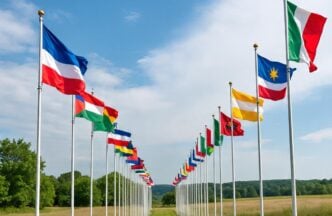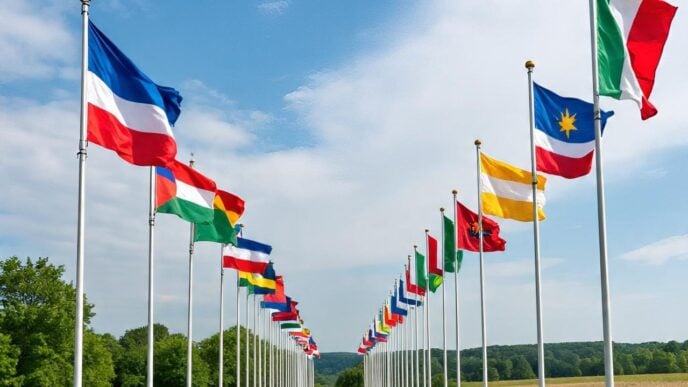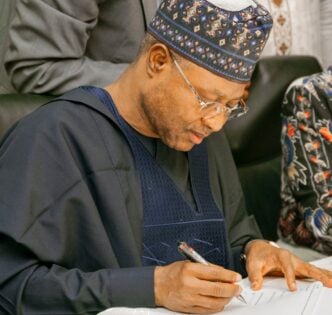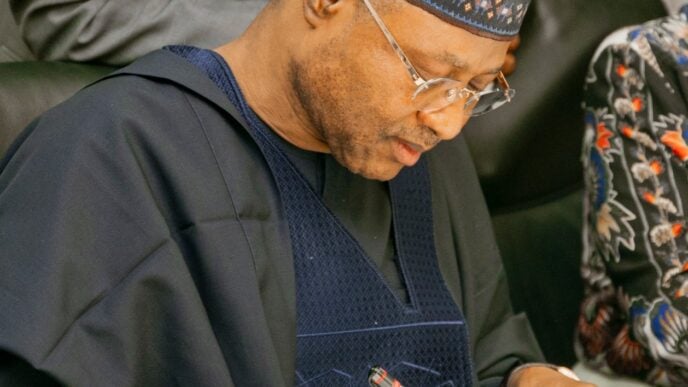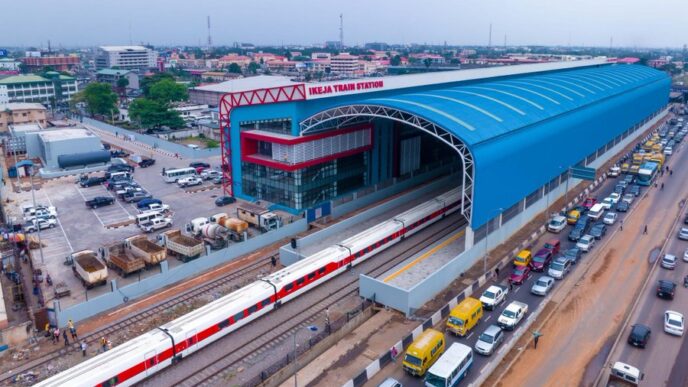BY BABATOPE FALADE ONIKOYI
Hilda Baci’s recent project for the largest pot of Jollof is indeed a great one. However, are we just a country of Afrobeats and Jollof? The purists say yes, and that it’s a distraction from our failures in science and technology. But what if they’re missing the bigger picture?
But what if the things they call ‘frivolous’—like Hilda Baci’s record-breaking cook-a-thon—are our greatest strategic advantage? It’s time we stopped apologising for our creativity and started leveraging it to build the Nigeria we want.”
The Poverty Argument
Advertisement
Nigerians have denigrated the event based on a range of arguments, one which holds that Hilda’s Jollof record-breaking act is attracting buzz because of Nigeria’s record poverty.
But then, we should ask, are British football fans also poor? In the same vein, at the height of Nigeria’s economic success under Olusegun Obasanjo, we embraced football fandom, a culture we still maintain.
Nigeria: A Producers ‘Potential’ Paradise
Advertisement
It is not a question of poverty; we Nigerians love novelty. That is why the rest of Africa appreciates us. And such a behaviour is a producer’s paradise. The best consumers are those who can appreciate different product and service dimensions at once.
In essence, Nigerians are just being Nigerians. Poverty or not.
However, poverty is not the only strong argument against the event. There is also the scientific innovation argument.
The Scientific Innovation Argument
Advertisement
But the most troubling argument, which also provides a global opportunity, is the one where some Nigerian intellectuals like Dan Bello have referenced the fact that Nigeria is more known, globally, for things like Afrobeats and our comic achievements on social media. That instead of striving for achievement in entertainment, it should be science and technology instead.
This argument is troubling because it may immediately water down the potential buzz and positive impact of Hilda’s record-breaking event. It also takes our eyes away from the real challenges of Nigeria.
Industrialisation: Why Scientific Innovation Proves Difficult in Nigeria.
However, I provide an alternative argument to the one above. While we must strive to attain global relevance in science and technology, we should retain the things we are currently good at.
Advertisement
Nigerians are creative and hardworking. We keep pushing the needle in the things we can.
Frankly, for a country that hardly has a constant power supply, there is little chance for scientific discovery or the threshold industrialisation capacity that usually births incremental innovation.
Advertisement
This is what I mean by “threshold industrialisation”. Imagine we are a country with functional industries across: textile, agro-allied, steel, oil and gas, automotive, etc.
What happens is that right within those industries, we will have research and development functions that will be tasked with coming up with value-added or radical improvements in certain cases.
Advertisement
These incremental improvements or radical innovations are possible because there is an existent incentive. That incentive lies in the fact that we are already industrialised.
But since we are not an industrialised nation in the global sense. In fact, based on the Africa Industrialisation Index (AII), Nigeria is ranked the 8th most industrialised country in Africa. Swaziland/Eswatini comes in at 6th before Nigeria.
Advertisement
For proper context, Nigeria’s GDP in 2023 was valued at $363.8 billion, while Swaziland/Eswatini’s GDP was $4.7 billion. Despite the fact that Nigeria’s GDP is 77 times that of Swaziland/Eswatini’s, the latter is more industrialised. It is simply not possible to be an advanced country in science and technology if industrialisation is abysmal.
In view of our failures with industrialisation, our youth are left with no option but to transfer their energies toward what is available. And what is that? Entertainment and culture! And are we doing our best? The answer is Yes.
No country makes most of its GDP from entertainment and culture. According to data from the OECD and other organisations indicates that for many G20 economies, this sector accounts for around 2-5% of total value added.
However, what entertainment and culture do is to provide the basis upon which nations can brand themselves and then attract investments in real estate and professional services. At least financial services, real estate and professional business services make up to 70 percent of the GDP of high-income countries.
Leveraging Entertainment and Culture for Global Investment Inflows
In the case of Nigeria, if we can address structural issues in property rights, tackle fraud and ramp up electricity development, we can begin to leverage our superiority in entertainment and culture to develop other sectors.
This recommendation has been explored by many countries. Notable examples include: South Korea, Japan and the UK in the 1990s.
See how the countries highlighted carried out these efforts.
1. South Korea (The “Korean Wave” or “Hallyu”)
South Korea is arguably the most successful and widely cited example. The government has actively promoted the “Hallyu” (Korean Wave), which includes K-pop music, K-dramas, films, and video games. This has created a global fascination with Korean culture, which has had tangible economic benefits.
How it worked:
The government, in collaboration with private corporations (“Chaebols”), invested in and promoted cultural exports. The global popularity of groups like BTS and Blackpink, and shows like Squid Game and Parasite, has significantly boosted South Korea’s international image.
Impact on other industries:
i) Tourism: The surge in interest has led to a massive increase in tourism, with visitors wanting to experience the culture and locations they see in films and dramas.
ii) Consumer Goods: The “nation brand” has been a powerful tool for promoting South Korean products. Brands like Samsung, LG, and Hyundai have benefited from the positive perception of South Korea’s modernity, innovation, and style, leading to increased foreign direct investment (FDI) and sales in these sectors.
iii) Food and Beauty: The global demand for Korean food, fashion, and beauty products (K-beauty) has skyrocketed, creating new export markets and business opportunities.
2. Japan (“Cool Japan”)
Japan was a pioneer in using its cultural exports for nation branding, with its “Cool Japan” strategy. Initially, this was a grassroots phenomenon, but the government has since institutionalised it to promote its creative industries globally.
How it worked:
The strategy focuses on promoting a wide range of cultural exports, including anime, manga, video games, cuisine, fashion, and traditional arts. The government has created the “Cool Japan Fund” to invest in private-sector initiatives that spread Japanese culture abroad.
Impact on other industries:
i) Tourism: “Cool Japan” has been a major driver of tourism, with people travelling to Japan for experiences related to anime conventions, cherry blossom festivals, or culinary tours.
ii) Technology & Products: Japan’s reputation for innovation and quality, built in part on the “Cool Japan” brand, has reinforced the perception of its high-tech products. This has helped maintain its competitive edge in industries like electronics and automotive manufacturing.
FDI: A positive national image makes Japan an attractive location for foreign companies to invest, as it signals a stable, innovative, and culturally rich environment.
3. The United Kingdom (“Cool Britannia”)
The UK’s “Cool Britannia” campaign in the 1990s was an early and influential example of nation branding. It aimed to modernise Britain’s image and showcase its vibrant contemporary culture.
How it worked:
The movement celebrated British popular culture, including music (Britpop), fashion, and art. The government’s public diplomacy efforts, led by the British Council, aimed to leverage this cultural buzz to attract talent and investment.
Impact on other industries:
i) Creative Industries: The campaign helped to establish London and other UK cities as global hubs for the creative industries, from advertising and design to film production.
ii) Tourism: The revitalised image helped attract tourists who were interested in the contemporary music and arts scene.
iii) Investment: “Cool Britannia” signalled a new, forward-thinking Britain, making it an appealing destination for foreign investors who saw a dynamic and innovative economy.
We should study these examples intently and think big about the possibilities.
What Hilda Baci and other Nigerian creators are doing lends Nigeria a great competitive advantage globally.
The question is this: will Nigeria seize this opportunity? And how far are we willing to dream and execute?
Babatope Falade Onikoyi is the founder of Kasai Africa
Views expressed by contributors are strictly personal and not of TheCable.


